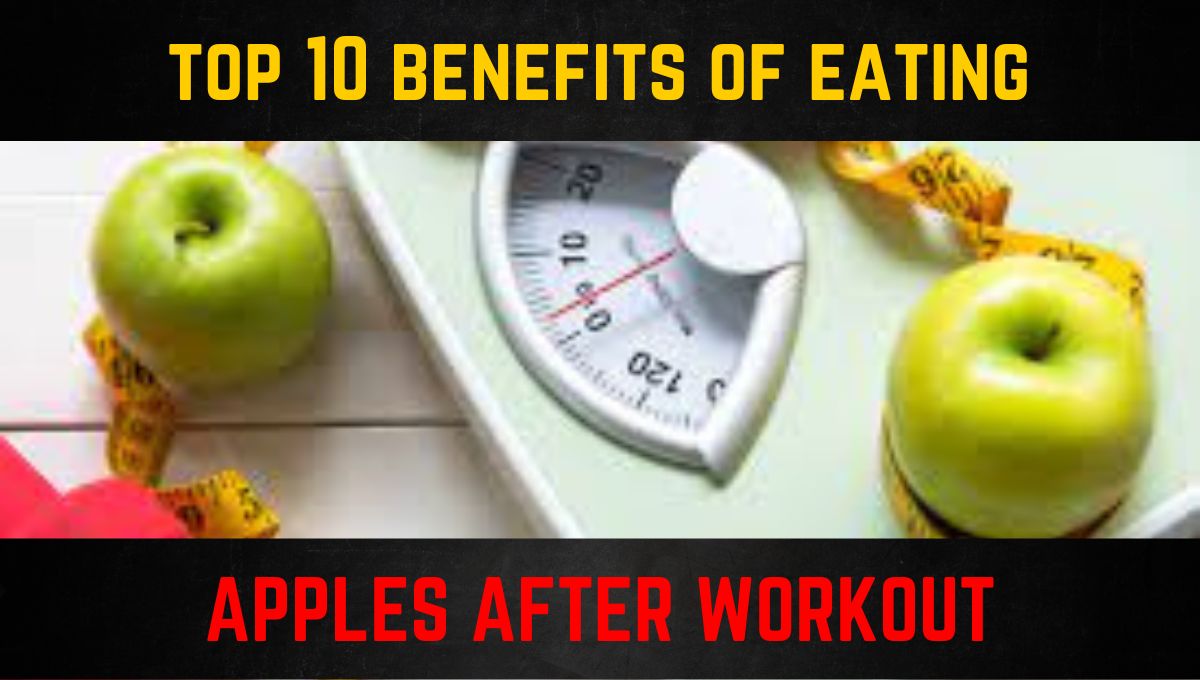While there are many post-workout snacks and meals to choose from, one option that often gets overlooked is the humble apple.
This crunchy and refreshing fruit is not only delicious but also packed with important nutrients that can help to support your fitness goals.
In this post, we’ll explore the benefits of eating apples after a workout and answer some frequently asked questions about this nutritious snack.
Whether you’re a seasoned athlete or just getting started with your fitness journey, read on to learn more about the power of apples.
Top 10 Benefits Of Eating Apples After Workout:
1. Apples promote hydration
Hydration is key to good health, and drinking water is essential to maintaining proper hydration levels.
However, many people may not know that they can also get hydrated by eating certain foods, like apples.
86% of the weight of an apple is water, which makes it a great food to help you recover your hydration post-workout.
Another advantage of getting hydration from whole foods like apples is that they are a low-calorie way to stay hydrated. Unlike sports drinks or other beverages that can be high in added sugars and calories, apples are a natural and healthy option that can help you maintain hydration without adding extra calories to your diet.
Additionally, the fiber in apples can help slow down the absorption of water and nutrients, which can help you stay hydrated for longer.
2. Apples boost energy levels
Apples are a great source of natural energy, thanks to their natural sugar content.
The natural sugars in apples, such as fructose and glucose, are easily absorbed by the body and provide a quick source of energy without the crash associated with sugary snacks.
3. Apples aid in weight loss
Apples are low in calories and high in fiber, making them an ideal post-workout snack for those trying to lose weight.
4. Apples reduce inflammation
The antioxidants in apples can help reduce inflammation in the body, which is especially important after a strenuous workout.
5. Apples improve heart health
Apples are rich in polyphenols, which have been shown to reduce the risk of cardiovascular disease.
6. Apples improve lung function
Recent studies have shown that apples can improve lung function and reduce the risk of respiratory diseases.
Incorporating apples into your post-workout diet can provide numerous health benefits, from aiding in muscle growth to reducing inflammation.
Plus, they’re a tasty and convenient snack to have on hand.
7. Apples can aid in lowering cholesterol
One of the many benefits of apples is their high polyphenol content. These powerful antioxidants have been shown to help lower LDL cholesterol levels, reducing the risk of cardiovascular disease.
Eating apples regularly can also help lower triglyceride levels, further protecting your heart health.
8. Apples support post-workout recovery
After a workout, your body needs nutrients to repair and recover. Apples are packed with minerals and vitamins that can aid in post-workout recovery.
They help reduce inflammation, improve your immune system, and replenish lost nutrients to give you the energy you need to keep going.
9. Apples may help manage diabetes
The polyphenols in apples can help regulate blood sugar levels, making them a good snack option for people with diabetes.
The fiber content in apples also helps slow down the absorption of sugar into the bloodstream, keeping glucose levels in check.
10. Apples can reduce muscle and joint soreness
Thanks to their anti-inflammatory properties, apples can help reduce soreness in muscles and joints, improving overall muscle strength.
Quercetin, a compound found in apples, can help keep joint pain and soreness away.
Some Important FAQs About Apples Post Workout And Their Answers:
1. How do apples compare to sports drinks or other post-workout snacks?
Apples provide a more natural source of hydration and energy than sports drinks, which are often high in added sugars and artificial ingredients.
While sports drinks can be beneficial for endurance athletes or those engaging in high-intensity workouts, apples can be a great alternative for people looking for a more natural and whole-food option.
2. What’s the best way to incorporate apples into a post-workout meal or snack?
Apples can be eaten on their own as a post-workout snack or incorporated into a larger meal, such as a salad or smoothie.
For a more filling snack, try pairing your apple with a source of protein, such as nut butter or Greek yogurt.
3. Are there any downsides to eating apples after a workout?
While apples are generally a healthy and nutritious choice for a post-workout snack, they do contain natural sugars and carbohydrates, which may not be suitable for people on a low-carb or ketogenic diet.
Additionally, some people may experience digestive discomfort or bloating if they eat too many apples at once.
4. How many apples should I eat after a workout?
There is no set amount of apples that you should eat after a workout, as it depends on your individual needs and preferences.
However, one medium-sized apple contains around 95 calories and 4.4 grams of fiber, making it a great choice for a post-workout snack.
5. Are there any other fruits or foods that are good to eat after a workout?
Yes, there are many fruits good to eat after workout.
Fruits and foods that are good to eat after a workout include bananas, berries, yogurt, nut butter, and whole-grain toast.
These foods provide a source of natural sugars, protein, and carbohydrates that can help to replenish energy stores and support recovery after exercise.
